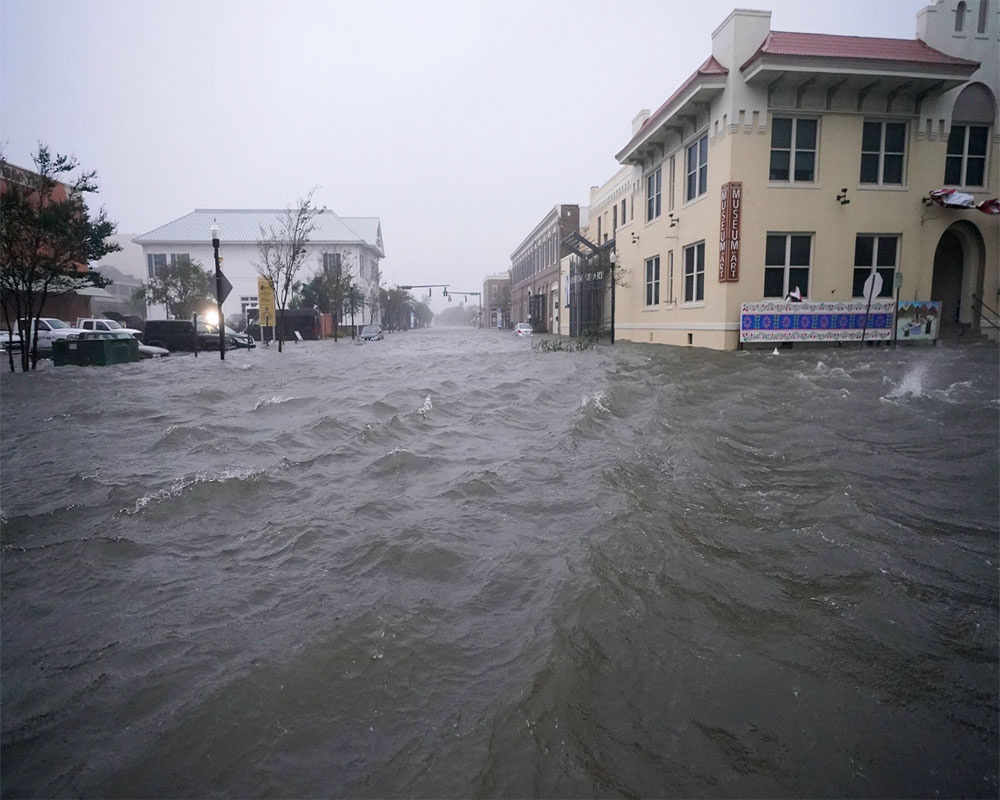Hurricane Sally lumbered ashore near the Florida-Alabama line Wednesday with 105 mph (165 kph) winds and rain measured in feet, not inches, killing at least one person, swamping homes and forcing the rescue of hundreds as it pushed inland for what could be a slow and disastrous drenching across the Deep South.
The death happened in Orange Beach, Alabama, according to Mayor Tony Kennon, who also told The Associated Press that one person was missing. Kennon said he couldn't immediately release details.
Moving at just 3 mph (5 kph), or about as fast as a person can walk, the storm made landfall at 4:45 am close to Gulf Shores, Alabama, about 30 miles (50 kilometers) from Pensacola, Florida.
It accelerated to a light jog as it battered the Pensacola and Mobile, Alabama, metropolitan areas encompassing nearly 1 million people.
Sally cast boats onto land or sank them at the dock, flattened palm trees, peeled away roofs, blew down signs and knocked out power to more than 540,000 homes and businesses. A replica of Christopher Columbus' ship the Nina that had been docked at the Pensacola waterfront was missing, police said.
Sally tore loose a barge-mounted construction crane, which then smashed into the new Three Mile Bridge over Pensacola Bay, causing a section of the year-old span to collapse, authorities said.
The storm also ripped away a large section of a fishing pier at Alabama's Gulf State Park on the very day a ribbon-cutting had been scheduled following a USD 2.4 million renovation.
By the afternoon, authorities in Escambia County, which includes Pensacola, said at least 377 people had been rescued from flooded areas.
More than 40 people trapped by high water were brought to safety within a single hour, including a family of four found in a tree, Sheriff David Morgan said.
Authorities in Pensacola said 200 National Guard members would arrive Thursday to help.
Curfews were announced in Escambia County and in some coastal Alabama towns.
Sally turned some Pensacola streets into white-capped rivers early Wednesday. Sodden debris and flooded cars were left behind as the water receded.
By early afternoon, Sally had weakened into a tropical storm. It was downgraded to a depression late Wednesday night with 35 mph (55 kph) sustained winds.
The National Weather Service said the system was still forecast to dump 4 inches (10 centimeters) to 8 inches (29 centimeters) of rain in southeast Alabama and central Georgia by Thursday night, with up to 1 foot (30.48 centimeters) in some spots.
At least eight waterways in south Alabama and the Florida Panhandle were expected to hit their major flood levels by Thursday. Some of the crests could break records, submerge bridges and flood some homes, the National Weather Service warned.
Morgan, the Escambia County sheriff, estimated thousands would need to flee rising waters in the coming days. Escambia officials urged residents to rely on text messages for contacting family and friends to keep cellphone service open for 911 calls.
There are entire communities that we're going to have to evacuate, the sheriff said.
It's going to be a tremendous operation over the next several days. West of Pensacola, in Perdido Key, Florida, Joe Mirable arrived at his real estate business to find the two-story building shattered.
Digging through the ruins, Mirable pointed out a binder labeled Hurricane Action Plan.
I think the professionals got this one wrong, he said before the wind blew away his hat.
More than 2 feet (61 centimeters) of rain was recorded near Naval Air Station Pensacola, and nearly 3 feet (1 meter) of water covered streets in downtown Pensacola, the National Weather Service reported.
It's not common that you start measuring rainfall in feet, said forecaster David Eversole.
Sally was the second hurricane to hit the Gulf Coast in less than three weeks and the latest to blow in during one of the busiest hurricane seasons ever.
Forecasters have nearly run through the alphabet of storm names with 2 1/2 months still to go.
At the start of the week, Sally was one of a record-tying five storms churning simultaneously in the Atlantic basin.
Like the wildfires raging on the West Coast, the onslaught of hurricanes has focused attention on climate change, which scientists say is causing slower, rainier, more powerful and more destructive storms.
























